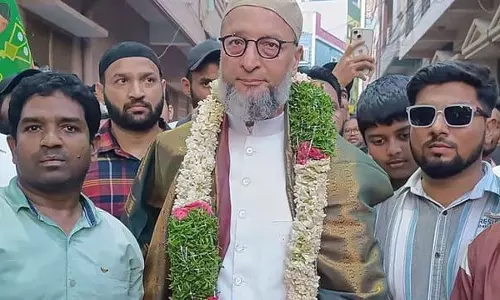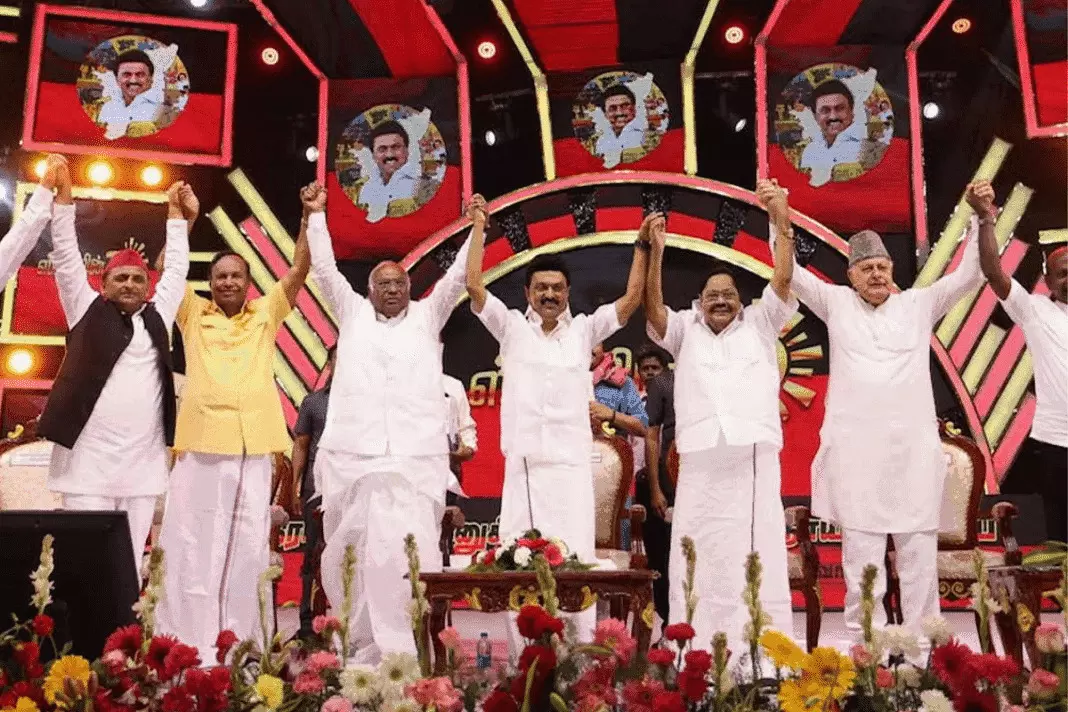
Backward community issues and opposition unity
text_fieldsThe All India Federation for Social Justice, an initiative of Tamil Nadu Chief Minister MK Stalin, held its inaugural national conference on April 3 in New Delhi and was noteworthy for a number of reasons. The participation of the leaders of 19 opposition political parties, either in person or online, is just one of them. They all shared the same perspectives regarding the issues affecting the backward classes and the need for collective strategies and initiatives. Additionally, the event was seen as a display of Opposition unity against the BJP and its anti-backward-community policies. Rajasthan Chief Minister Ashok Gehlot (Congress), Jharkhand CM Hemant Soren (JMM), Trinamool Congress Rajya Sabha MP Derek O’Brien, Bihar Deputy CM Tejashwi Yadav (RJD), CPM general secretary Sitaram Yechury, CPI general secretary D Raja, Samajwadi Party president Akhilesh Yadav, Jammu and Kashmir National Conference president Farooq Abdullah, NCP leader Chaggan Bhujbal, and AAP Rajya Sabha MP Sanjay Singh and others were present. Stalin said that rather than isolated regional movements, the struggle for social justice has to be coordinated at the national level. His line was well received by the entire conference. The programme also served several purposes, including promoting opposition unity as well as addressing concerns related to reservations, challenges faced by the backward classes and the need for a caste census.
While most opposition parties see reservation in employment and education as a means of empowering the backward, for the BJP it is a means of wooing communities in elections. The most recent example of this is Karnataka's new four per cent reservation for Lingayat and Vokkaliga communities and the removal of the existing four per cent reservation for Muslims. BJP does not hope to win Muslim votes, but instead, aims to win more Hindu votes through polarization. The BJP's way of appeasing such groups is by showing a mere symbolic representation of backward tribals which is visible from the election of Draupadi Murmu as President to erecting statues of historical figures of backward class leaders. Other than dealing with isolated backward communities and winning them over, the BJP shuns organized movements by various backward groups. One significant manifestation is the opposition of the BJP to the caste census. On that score, Tejashwi Yadav highlighted the Bihar caste survey initiative of which the second phase, he said, will begin on April 15. He pointed out that as a state, Bihar could not conduct a census, as that is a union subject and so the state was making a caste survey. The national census, which was scheduled for 2021, is being delayed by the BJP-led administration with no declared timeline as of now.
Stalin reasoned that if the backward classes could be made ready for the fight for social justice, it would create a front against injustice. The majority of the opposition parties are likely to agree. Derrick O'Brien pointed out the absence of YSR Congress leader Jag Mohan Reddy of Andhra Pradesh and Biju Janata Dal leader Naveen Patnaik of Odisha from the event and appealed them to join the cause. If the opposition parties are ready to unite on common issues and, as Stalin said, set aside their 'ego' recognizing the arch enemy, the division of anti-BJP votes can be reduce, albeit with minor local rivalries. The opposition's unified demonstration on Thursday, after the Parliament's adjournment, furthered their sense of unity. It should not be forgotten that at one point in Indian politics, there was a partial polarization in electoral situation with those who supported Mandal (Commission) politics on one side and those who opposed it on the other. It can happen again. For the overall health of the nation, there is a need for an environment where national wealth and power are shared equitably. Before that, and more importantly, the forces that divide the people and create an atmosphere of conflicts should be removed from the seats of power. It would be a good start if efforts for that are strengthened by the collective efforts of the opposition parties.


























